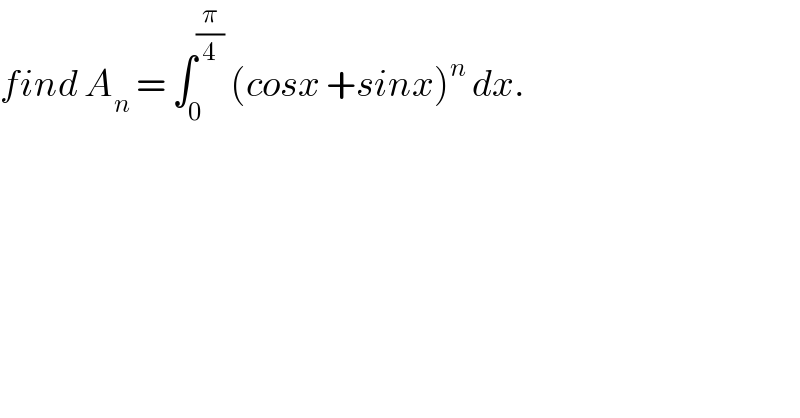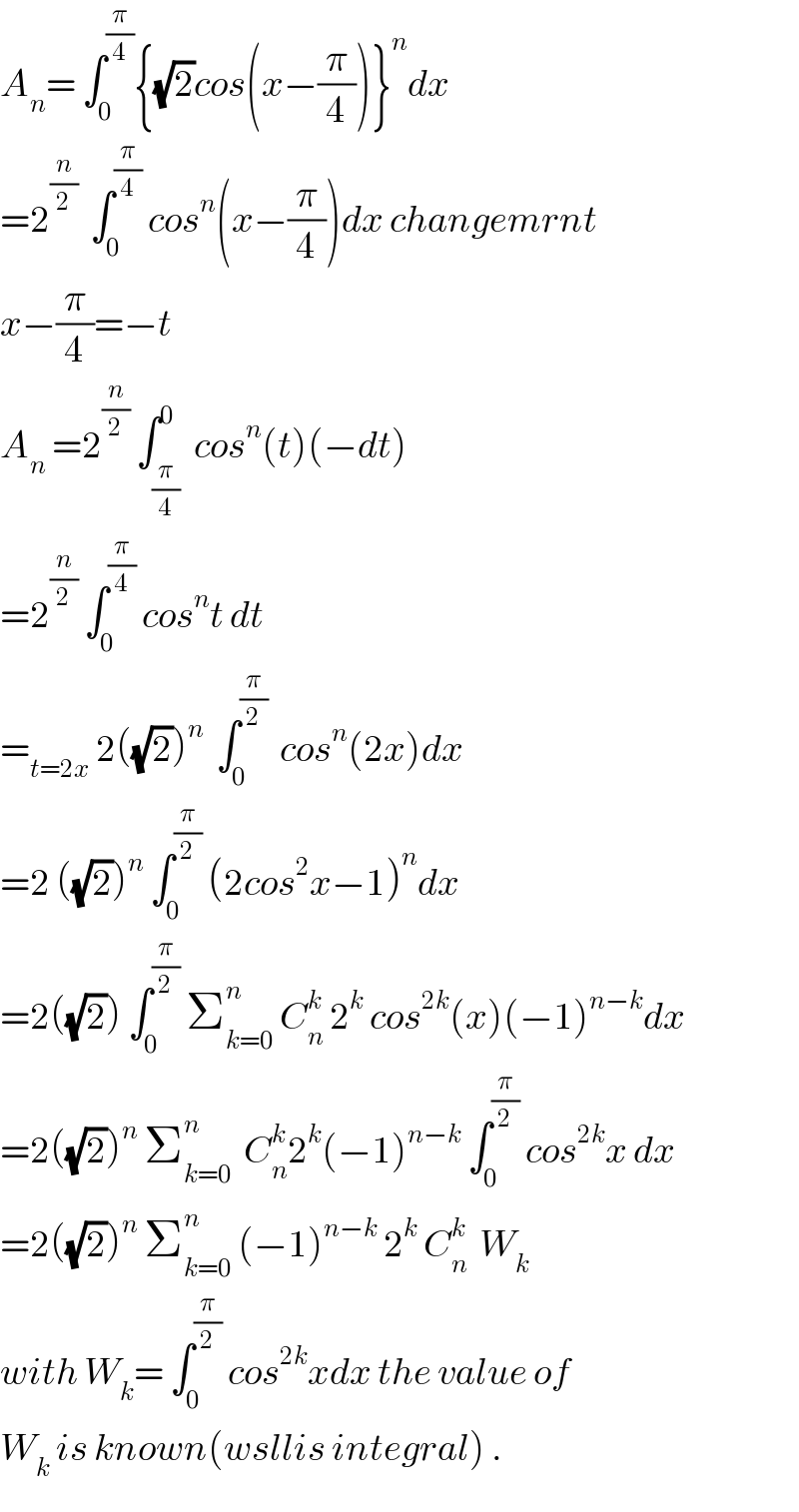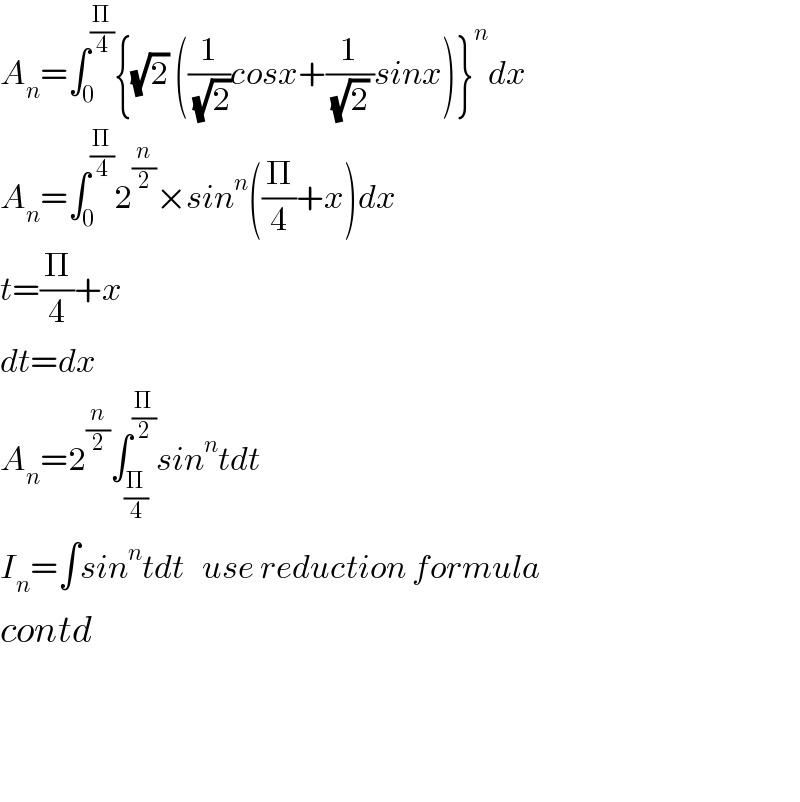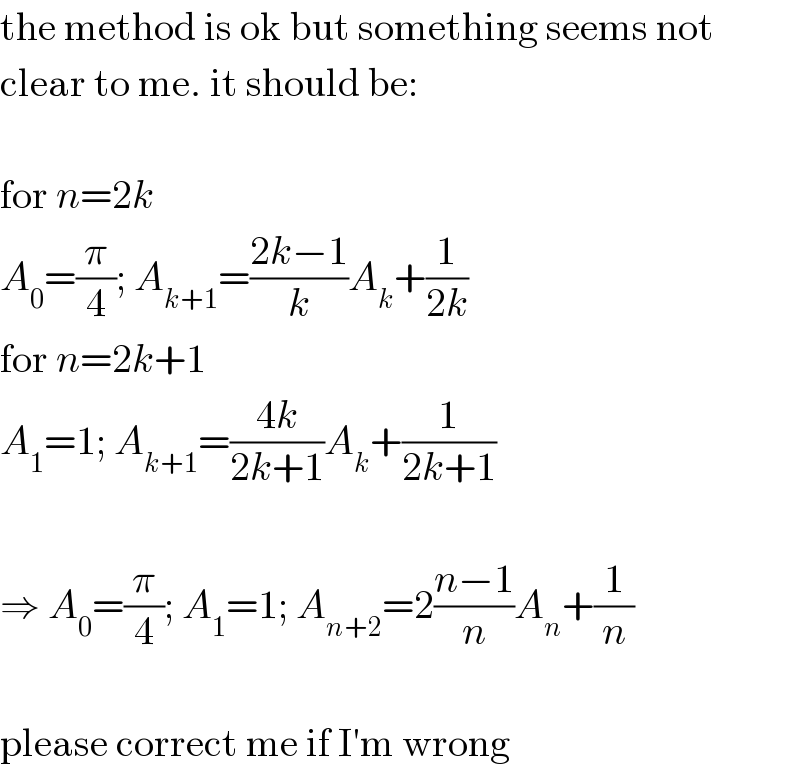Question Number 36762 by abdo.msup.com last updated on 05/Jun/18

$${find}\:{A}_{{n}} \:=\:\int_{\mathrm{0}} ^{\frac{\pi}{\mathrm{4}}} \:\left({cosx}\:+{sinx}\right)^{{n}} \:{dx}. \\ $$
Commented by tanmay.chaudhury50@gmail.com last updated on 05/Jun/18

Commented by abdo.msup.com last updated on 05/Jun/18

$${A}_{{n}} =\:\int_{\mathrm{0}} ^{\frac{\pi}{\mathrm{4}}} \left\{\sqrt{\mathrm{2}}{cos}\left({x}−\frac{\pi}{\mathrm{4}}\right)\right\}^{{n}} {dx} \\ $$$$=\mathrm{2}^{\frac{{n}}{\mathrm{2}}} \:\:\int_{\mathrm{0}} ^{\frac{\pi}{\mathrm{4}}} \:{cos}^{{n}} \left({x}−\frac{\pi}{\mathrm{4}}\right){dx}\:{changemrnt} \\ $$$${x}−\frac{\pi}{\mathrm{4}}=−{t} \\ $$$${A}_{{n}} \:=\mathrm{2}^{\frac{{n}}{\mathrm{2}}} \:\int_{\frac{\pi}{\mathrm{4}}} ^{\mathrm{0}} \:{cos}^{{n}} \left({t}\right)\left(−{dt}\right) \\ $$$$=\mathrm{2}^{\frac{{n}}{\mathrm{2}}} \:\int_{\mathrm{0}} ^{\frac{\pi}{\mathrm{4}}} \:{cos}^{{n}} {t}\:{dt} \\ $$$$=_{{t}=\mathrm{2}{x}} \:\mathrm{2}\left(\sqrt{\mathrm{2}}\right)^{{n}} \:\:\int_{\mathrm{0}} ^{\frac{\pi}{\mathrm{2}}} \:\:{cos}^{{n}} \left(\mathrm{2}{x}\right){dx} \\ $$$$=\mathrm{2}\:\left(\sqrt{\mathrm{2}}\right)^{{n}} \:\int_{\mathrm{0}} ^{\frac{\pi}{\mathrm{2}}} \:\left(\mathrm{2}{cos}^{\mathrm{2}} {x}−\mathrm{1}\right)^{{n}} {dx} \\ $$$$=\mathrm{2}\left(\sqrt{\mathrm{2}}\right)\:\int_{\mathrm{0}} ^{\frac{\pi}{\mathrm{2}}} \:\sum_{{k}=\mathrm{0}} ^{{n}} \:{C}_{{n}} ^{{k}} \:\mathrm{2}^{{k}} \:{cos}^{\mathrm{2}{k}} \left({x}\right)\left(−\mathrm{1}\right)^{{n}−{k}} {dx} \\ $$$$=\mathrm{2}\left(\sqrt{\mathrm{2}}\right)^{{n}} \:\sum_{{k}=\mathrm{0}} ^{{n}} \:\:{C}_{{n}} ^{{k}} \mathrm{2}^{{k}} \left(−\mathrm{1}\right)^{{n}−{k}} \:\int_{\mathrm{0}} ^{\frac{\pi}{\mathrm{2}}} \:{cos}^{\mathrm{2}{k}} {x}\:{dx} \\ $$$$=\mathrm{2}\left(\sqrt{\mathrm{2}}\right)^{{n}} \:\sum_{{k}=\mathrm{0}} ^{{n}} \:\left(−\mathrm{1}\right)^{{n}−{k}} \:\mathrm{2}^{{k}} \:{C}_{{n}} ^{{k}} \:\:{W}_{{k}} \\ $$$${with}\:{W}_{{k}} =\:\int_{\mathrm{0}} ^{\frac{\pi}{\mathrm{2}}} \:{cos}^{\mathrm{2}{k}} {xdx}\:{the}\:{value}\:{of} \\ $$$${W}_{{k}} \:{is}\:{known}\left({wsllis}\:{integral}\right)\:. \\ $$
Answered by tanmay.chaudhury50@gmail.com last updated on 05/Jun/18

$${A}_{{n}} =\int_{\mathrm{0}} ^{\frac{\Pi}{\mathrm{4}}} \left\{\sqrt{\mathrm{2}}\:\left(\frac{\mathrm{1}}{\:\sqrt{\mathrm{2}}}{cosx}+\frac{\mathrm{1}}{\:\sqrt{\mathrm{2}}\:}{sinx}\right)\right\}^{{n}} {dx} \\ $$$${A}_{{n}} =\int_{\mathrm{0}} ^{\frac{\Pi}{\mathrm{4}}} \mathrm{2}^{\frac{{n}}{\mathrm{2}}} ×{sin}^{{n}} \left(\frac{\Pi}{\mathrm{4}}+{x}\right){dx} \\ $$$${t}=\frac{\Pi}{\mathrm{4}}+{x} \\ $$$${dt}={dx} \\ $$$${A}_{{n}} =\mathrm{2}^{\frac{{n}}{\mathrm{2}}} \int_{\frac{\Pi}{\mathrm{4}}} ^{\frac{\Pi}{\mathrm{2}}} {sin}^{{n}} {tdt} \\ $$$${I}_{{n}} =\int{sin}^{{n}} {tdt}\:\:\:{use}\:{reduction}\:{formula} \\ $$$${contd} \\ $$$$\: \\ $$$$ \\ $$$$\:\: \\ $$
Commented by NECx last updated on 05/Jun/18

$${wow}….\:{i}\:{had}\:{never}\:{thouvht}\:{of} \\ $$$${this}. \\ $$
Commented by MJS last updated on 05/Jun/18

$$\mathrm{the}\:\mathrm{method}\:\mathrm{is}\:\mathrm{ok}\:\mathrm{but}\:\mathrm{something}\:\mathrm{seems}\:\mathrm{not} \\ $$$$\mathrm{clear}\:\mathrm{to}\:\mathrm{me}.\:\mathrm{it}\:\mathrm{should}\:\mathrm{be}: \\ $$$$ \\ $$$$\mathrm{for}\:{n}=\mathrm{2}{k} \\ $$$${A}_{\mathrm{0}} =\frac{\pi}{\mathrm{4}};\:{A}_{{k}+\mathrm{1}} =\frac{\mathrm{2}{k}−\mathrm{1}}{{k}}{A}_{{k}} +\frac{\mathrm{1}}{\mathrm{2}{k}} \\ $$$$\mathrm{for}\:{n}=\mathrm{2}{k}+\mathrm{1} \\ $$$${A}_{\mathrm{1}} =\mathrm{1};\:{A}_{{k}+\mathrm{1}} =\frac{\mathrm{4}{k}}{\mathrm{2}{k}+\mathrm{1}}{A}_{{k}} +\frac{\mathrm{1}}{\mathrm{2}{k}+\mathrm{1}} \\ $$$$ \\ $$$$\Rightarrow\:{A}_{\mathrm{0}} =\frac{\pi}{\mathrm{4}};\:{A}_{\mathrm{1}} =\mathrm{1};\:{A}_{{n}+\mathrm{2}} =\mathrm{2}\frac{{n}−\mathrm{1}}{{n}}{A}_{{n}} +\frac{\mathrm{1}}{{n}} \\ $$$$ \\ $$$$\mathrm{please}\:\mathrm{correct}\:\mathrm{me}\:\mathrm{if}\:\mathrm{I}'\mathrm{m}\:\mathrm{wrong} \\ $$
Commented by tanmay.chaudhury50@gmail.com last updated on 05/Jun/18

Commented by tanmay.chaudhury50@gmail.com last updated on 05/Jun/18

$${pls}\:{show}\:{some}\:{steps}\:{to}\:{understand}…{you}\:{also} \\ $$$${right}.. \\ $$
